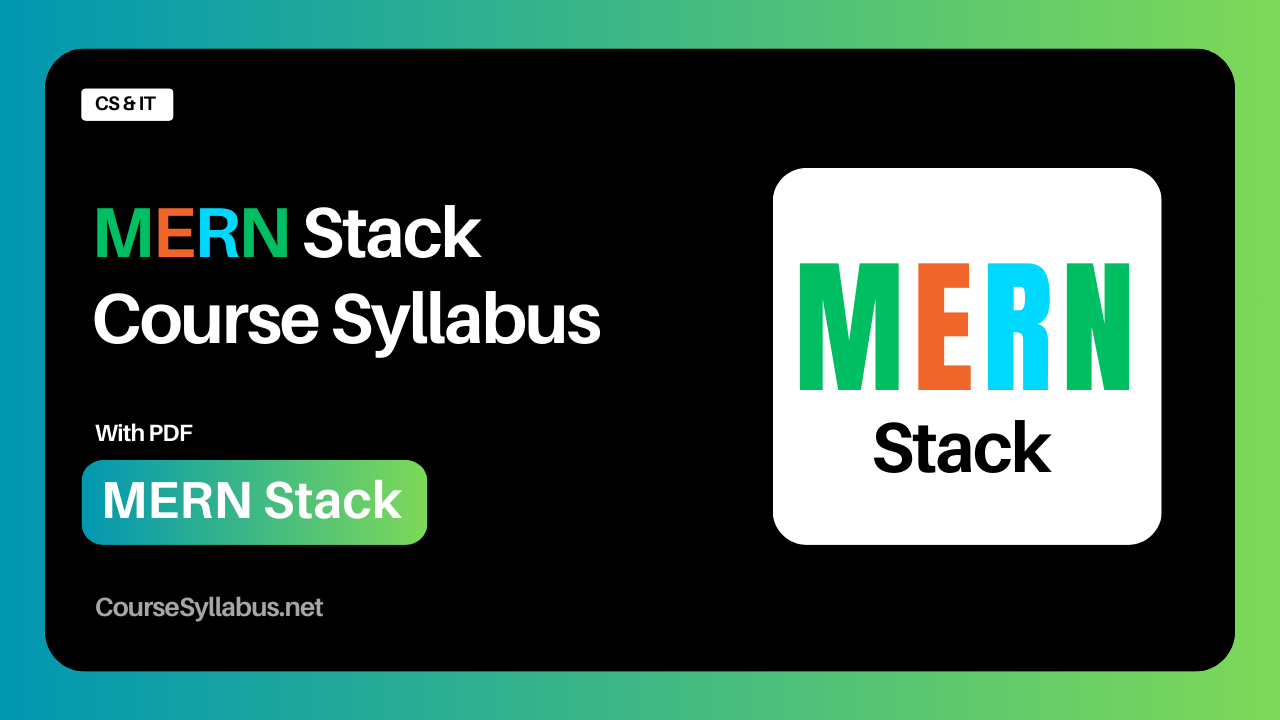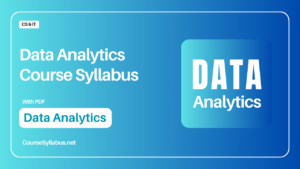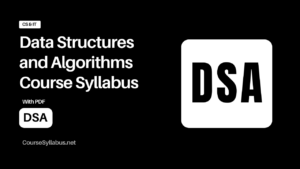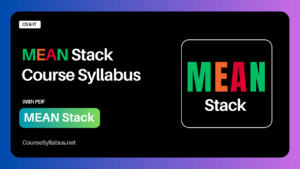The MERN stack is a popular and powerful technology stack used for building full-stack web applications. It consists of four main technologies: MongoDB, Express.js, React.js, and Node.js. Each component of the MERN stack serves a specific purpose in the development process, allowing developers to create dynamic and scalable web applications efficiently.
- MongoDB: NoSQL database storing data in JSON-like documents.
- Express.js: Web application framework for Node.js, simplifying server-side development.
- React.js: JavaScript library for building user interfaces.
- Node.js: JavaScript runtime for server-side applications.
MERN Stack Course Syllabus
Module 1: Introduction to Web Development
- Overview of Web Development
- Understanding Client-server Architecture
- Introduction to Frontend, Backend, and Full-Stack Development
- Setting up Development Environment (IDEs, Text Editors, Browser Tools)
Module 2: HTML (Hypertext Markup Language)
- Introduction to HTML
- HTML Syntax and Structure
- HTML Elements and Attributes
- Semantic HTML5 Tags
- Forms and Input Elements
- Tables and Lists in HTML
- Accessibility Best Practices
- Semantic HTML for SEO
Module 3: CSS (Cascading Style Sheets)
- Introduction to CSS
- CSS Syntax and Selectors
- CSS Box Model (Margin, Border, Padding)
- CSS Layout Techniques (Floats, Flexbox, Grid)
- Responsive Web Design with Media Queries
- CSS Transitions and Animations
- CSS Preprocessors (e.g., Sass)
- CSS Frameworks (e.g., Bootstrap, Tailwind CSS)
Module 4: JavaScript Fundamentals
- Introduction to JavaScript
- Variables, Data Types, and Operators
- Control Structures (if-else, switch, loops)
- Functions and Scope
- Arrays and Objects
- DOM (Document Object Model) Manipulation
- Events and Event Handling
Module 5: Frontend Development with React.js
- Introduction to React.js and JSX
- React Components (Class Components, Functional Components)
- Props and State Management
- React Lifecycle Methods
- React Hooks (useState, useEffect, etc.)
- React Router for Navigation
- Managing State with Redux
- Redux Middleware and Thunk for Async Operations
- React Forms and Form Validation
Module 6: Backend Development with Node.js and Express.js
- Introduction to Node.js and Express.js
- Setting up Node.js Development Environment
- Building RESTful APIs with Express
- Express Middleware for Request Handling
- Handling CORS (Cross-Origin Resource Sharing)
- User Authentication with JWT (JSON Web Tokens)
- Express Routing and Parameter Handling
- File Uploads with Multer
- Error Handling and Validation
Module 7: Database Management with MongoDB
- Introduction to MongoDB and NoSQL Databases
- CRUD Operations with MongoDB
- Data Modeling with Mongoose
- Indexing and Aggregation Framework
- Working with Embedded Documents and Arrays
- Geospatial Queries with MongoDB
- Transactions and ACID Compliance in MongoDB
- Data Migration and Backup Strategies
Module 8: Full-Stack Application Development
- Integrating React.js with Node.js and Express.js
- Connecting to MongoDB from Node.js
- Building RESTful API Endpoints
- Consuming APIs in React.js Frontend
- User Authentication and Authorization Flow
- Handling User Input and Form Submissions
- File Uploads and Storage Management
- Deployment Strategies for Full-Stack Applications
Module 9: Advanced Topics
- Real-Time Communication with WebSockets
- Server-Side Rendering (SSR) with React
- Testing and Debugging Web Applications
- Performance Optimization Techniques
- Security Best Practices (SQL Injection, XSS, CSRF)
- CI/CD (Continuous Integration and Continuous Deployment)
- Microservices Architecture and Scaling Strategies
- Exploring GraphQL for API Development
Module 10: Project Work
- Final Project Assignment
- Planning and Designing a Full-Stack Web Application
- Implementation and Development of the Project
- Testing, Debugging, and Refactoring
- Project Presentation and Demo
- Peer Review and Feedback
Learning Resources for MERN Stack
There are many resources available for learning MERN Stack ranging from online tutorials and courses to books and interactive platforms. Here are some popular options:
Time for Learning MERN Stack
- Basic Understanding (1-3 months): If you have some web development knowledge, you can grasp the basics of MERN in 1-3 months.
- Intermediate Proficiency (3-6 months): With hands-on practice, you can reach an intermediate level in 3-6 months.
- Advanced Mastery (6+ months): Achieving advanced skills, including complex topics, may take over 6 months with dedicated practice and project work.
Career Opportunities for MERN Stack
- Full-Stack Developer: Develop end-to-end web applications using the MERN stack, handling both frontend and backend responsibilities.
- Frontend Developer: Specialize in building interactive and user-friendly interfaces using React.js within the MERN stack.
- Backend Developer: Focus on building robust server-side logic and APIs using Node.js and Express.js in the MERN stack.
- JavaScript Developer: Leverage your expertise in JavaScript to work on frontend, backend, or full-stack development projects within the MERN stack.
- Web Application Developer: Build dynamic and scalable web applications, leveraging the power of MongoDB, Express.js, React.js, and Node.js in the MERN stack.
- UI/UX Developer: Design and implement intuitive user interfaces while ensuring a seamless user experience in MERN stack applications.
- Software Engineer: Work on large-scale software development projects, utilizing the MERN stack for building robust and scalable solutions.
- Freelance Developer: Offer your MERN stack expertise as a freelance developer, working on diverse projects for clients globally.
- Startup Founder: Use your MERN stack skills to develop and launch your startup, building innovative web applications and products.
- Technical Consultant: Provide consultancy services to businesses looking to adopt or optimize their use of the MERN stack for their web development projects.
Conclusion:
Mastering the MERN stack opens numerous career opportunities in web development. With skills in React.js, Node.js, Express.js, and MongoDB, professionals can pursue roles in frontend, backend, or full-stack development. Demand for MERN developers is high across industries, offering diverse career paths in startups, tech companies, and freelance projects.




